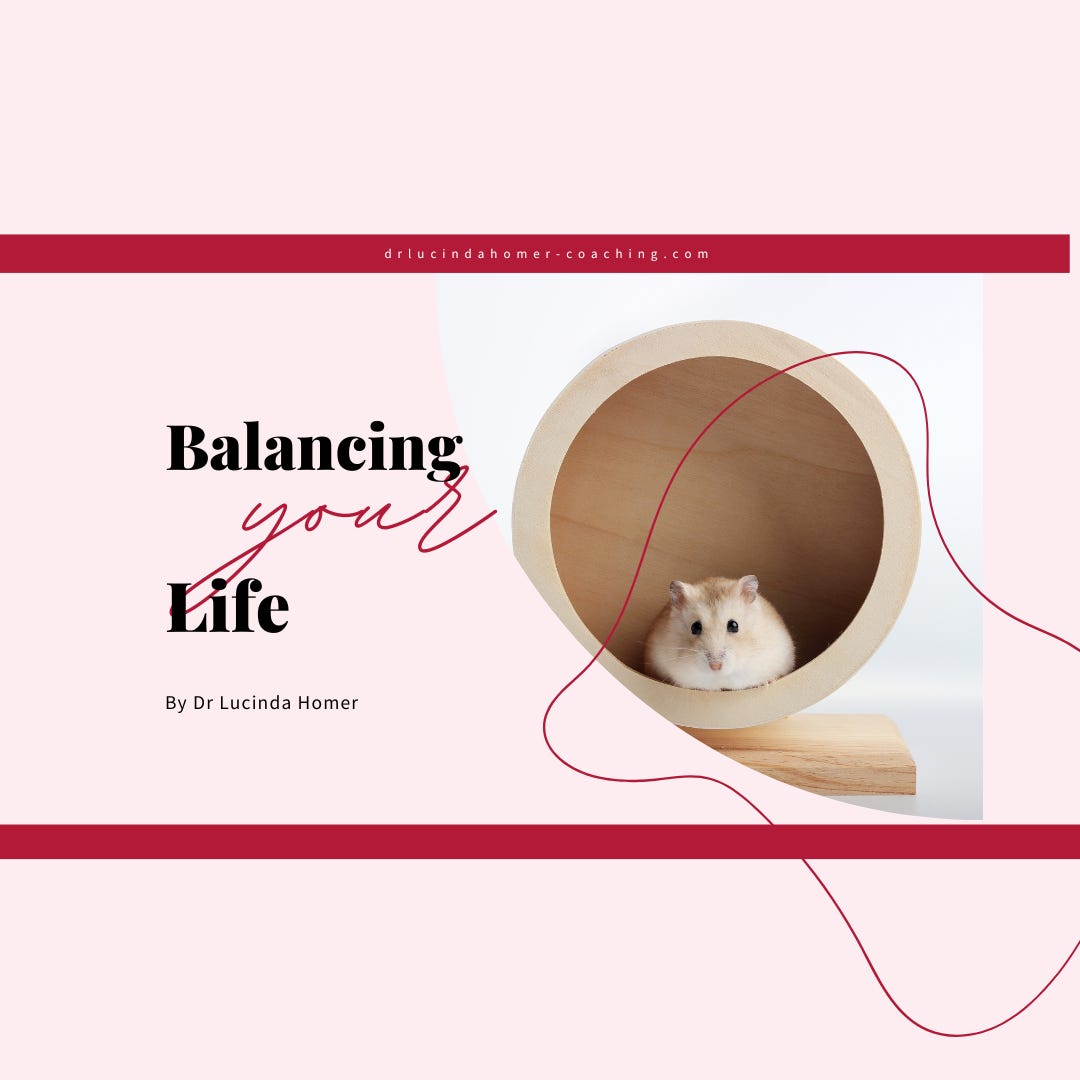Is your life out of balance? Here are 5 strategies to get things back on track.
Life sometimes feels like it is happening to you. Some or all of it can feel out of control. Women get stuff done. It goes with the territory. We do responsible jobs and manage busy lives at home. There are lots of balls in the air and we do not like it when we drop one. Juggling becomes a way of life, and we get incredibly good at it. BUT that comes at the expense of making sure that the team leader (YOU) is up to the job.
It is easy to focus on the “important stuff” and push your own wants and needs to the side. You think that it will be temporary: “I’ll just focus on this for now and then I will have time for me later.” But later is usually when you are too knackered to do anymore.
The imbalance tends to be insidious, and it creeps up on you. It becomes your new normal and you ignore what is happening to you. I did exactly that until the point that my brain and body decided enough was enough. There was no escaping the build-up of stress and exhaustion. I had to pay attention to what was going on.
How does imbalance show up?
It is different for everyone, but an unbalanced life is a source of stress. You may have symptoms of chronic stress, that can appear in some of these ways:
Mind
Unenthusiastic about the things you used to enjoy
More anxious than normal
Feel overwhelmed. You may not know what your wants and needs are anymore
Feel sad or depressed
Feel irritable and get angry easily
Feel full of resentment
Restlessness. You may feel stuck and unsure of what to do about it.
Body
Headaches
Fatigue
Sleep problems
Aches and pains
Change in libido
Upset stomach
Behaviour
You may push unpleasant feelings away by doing more of other things (work, exercise, drink, drugs, smoking, eating)
You may do less of things (socialising, eating, exercise)
You please everyone else and the expense of your own needs
Get angry
If you recognise yourself in that list, then you can start to do something about it today.
Here are 5 strategies for you to try:
1. How often do you take stock and look at what you really do with your time?
Be honest and work out what you spend your time doing. You will be able to see what you could do less of and that will give you more space to do more of what you would like to do.
Completing a Wheel of Life coaching tool can be helpful. There are instructions for what to do in my online course (see below).
Bring your ideas of a balanced life to life with a vision board.
2. Have you tried active relaxation?
No, I have not gone mad. Doing something active helps to reduce stress levels and something simple like going for a walk counts. I am reading “52 Ways to Walk: The Surprising Science of Walking for Wellness and Joy, One Week at a Time” by Annabel Streets. There is lots of inspiration and chapter 7 is “Take a 12-minute walk,” even I can find 12 minutes in a busy day.
Try to build in some physical exercise to your week. You do NOT have to join a Gym. The most important thing is to find something that you like doing and keep showing up.
You may think that scrolling social media and binge-watching TV helps you to relax, but it does not help in the long term. Falling into the comparison trap adds to stress.
Revisit old hobbies or try something new. This is fantastic way to get into a “flow” state and practice being mindful.
3. Make sure that you are not running on an empty tank.
This statement has several meanings.
Think about your diet and what you are drinking. Fuelling your body with the right things is important for your wellbeing.
Pay attention to your sleep. If you do not get enough sleep, you may find that it has a negative impact on your mood. Alcohol and caffeine play havoc on your sleep, so try to modify your intake. You may have heard of sleep hygiene, and this is a useful link to find out more.
Perimenopause and menopause can have a disruptive effect on sleep. Knowledge is power, so find out about how you want to manage your menopause and talk to your doctor if you think that would help.
Do something just for you every day. It can be as small as you like, but it will help you to manage your stress and refill your wellbeing tank.
4. Nurture your social life.
It is tempting to hunker down and hide away when you feel overwhelmed and busy. Spending time with family and friends is an excellent way to extend your support network and manage stress (choose wisely - see below).
Choose to spend time with the people who make you feel good and avoid the “drainers.” That applies equally to family and friends.
5. Get some support
You do not have to do this alone. Finding balance can be hard when you are conditioned to keeping your head down and going from one task to the next.
If you are worried that you might have depression or anxiety, then go to see your doctor. There are also some excellent resources on the NHS Every Mind Matters website.
You can find support in many places: friends, family, join a group, take a course, work with a coach.
Let me know how you manage stress in the comments.
When you have a deeper understanding of how you spend your time, you are in a great position to decide what you want to do less of and what you would like to do more of. This is the first step towards deciding what you want to change. This is an exciting time in your life filled with possibilities and you have the power to decide where you are going next.
I have a short online course to help you work out where you are now, what you would like to change to get to where you would like to be. It is called “Balancing your life.”
What do you get?
Your own homepage to keep you organised
Content to read, listen or watch
Tasks to complete
Habit tracker
Smart documents and space to journal
Forum to ask questions and get support
It costs £40 and is available to buy here.





